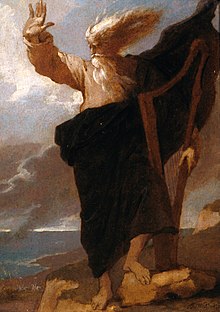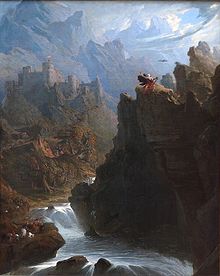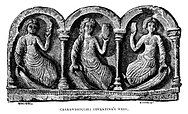Bard


| Part ofa serieson |
| Celtic mythologies |
|---|
 |
In Celtic cultures, abardis a professionalstory teller,verse-maker, music composer,oral historianandgenealogist,employed by a patron (such as amonarchor chieftain) to commemorate one or more of the patron's ancestors and to praise the patron's own activities.
With the decline of a living bardic tradition in themodern period,the term has loosened to mean a genericminstrelor author (especially a famous one). For example,William ShakespeareandRabindranath Tagoreare respectively known as "the Bard of Avon" (often simply "the Bard" ) and "the Bard of Bengal".[1][2]In 16th-century Scotland, it turned into a derogatory term for anitinerantmusician; nonetheless it was later romanticised by SirWalter Scott(1771–1832).[1]
Etymology[edit]
The English termbardis aloan wordfrom theCeltic languages:Gaulish:bardo-('bard, poet'),Middle Irish:bardandScottish Gaelic:bàrd('bard, poet'),Middle Welsh:bardd('singer, poet'),Middle Breton:barz('minstrel'),Old Cornish:barth('jester').[3][4]The ancient Gaulish *bardosis attested asbardus(sing.) in Latin and asbárdoi(plur.) in Ancient Greek. It also appears as asteminbardo-cucullus('bard's hood'),bardo-magus('field of the bard'),barditus(a song to fire soldiers), and inbardala('crested lark', a singing bird).[3]
All of these terms come from theProto-Celticnoun*bardos('poet-singer, minstrel'), itself derived, with regular Celticsound shift*gʷ>*b,from theProto-Indo-Europeancompound*gʷrH-dʰh₁-o-s,which literally means 'praise-maker'.[3][5][4]It iscognatewithSanskrit:gṛṇā́ti('calls, praise'),Latin:grātus('grateful, pleasant, delightful'),Lithuanian:gìrti('praise'), andArmenian:kardam('raise voice').[3][4]
History[edit]
In the words of theOxford English Dictionary,the bards were an "ancient Celtic order of minstrel-poets, whose primary function appears to have been to compose and sing (usually to the harp) verses celebrating the achievements of chiefs and warriors, and who committed to verse historical and traditional facts, religious precepts, laws, genealogies, etc."[1]
In medievalGaelicandWelshsociety, abard(Scottishand Irish Gaelic) orbardd(Welsh) was a professional poet, employed to composeelegiesfor hislord.If the employer failed to pay the proper amount, the bard would then compose asatire(c.f.fili,fáith). In other Indo-European societies, the same function was fulfilled byskalds,rhapsodes,minstrelsandscops,among others. A hereditary caste of professional poets inProto-Indo-European societyhas been reconstructed by comparison of the position of poets in medieval Ireland and in ancient India in particular.[6]
Bards (who are not the same as the Irishfilidhorfili) were those who sang the songs recalling the tribal warriors' deeds of bravery as well as the genealogies and family histories of the ruling strata amongCelticsocieties. The pre-Christian Celtic people recorded no written histories; however, Celtic peoples did maintain an intricate oral history committed to memory and transmitted by bards and filid. Bards facilitated the memorization of such materials by the use ofmetre,rhymeand other formulaic poetic devices.[citation needed]
Regions[edit]
Ireland[edit]
This sectionneeds expansion.You can help byadding to it.(April 2014) |
In medieval Ireland, bards were one of two distinct groups of poets, the other being thefili.According to theEarly Irish lawtext on status,Uraicecht Becc,bards were a lesser class of poets, not eligible for higher poetic roles as described above. However, it has also been argued that the distinction betweenfilid(pl. offili) and bards was a creation of Christian Ireland, and that thefilidwere more associated with the church.[7][8]By the Early Modern Period, these names came to be used interchangeably.[9]
Irish bards formed a professional hereditarycasteof highly trained, learned poets. The bards were steeped in the history and traditions ofclanand country, as well as in the technical requirements of a verse technique that wassyllabicand usedassonance,half rhymeandalliteration,among other conventions. As officials of the court of king or chieftain, they performed a number of official roles. They werechroniclersandsatiristswhose job it was to praise their employers and damn those who crossed them.[10]It was believed that a well-aimed bardic satire,glam dicenn,could raise boils on the face of its target.

The bardic system lasted until the mid-17th century in Ireland and the early 18th century in Scotland. In Ireland, their fortunes had always been linked to the Gaelic aristocracy, which declined along with them during theTudor Reconquest.[11]
The early history of the bards can be known only indirectly through mythological stories. The first mention of the bardic profession in Ireland is found in theBook of Invasions,in a story about the Irish colony ofTuatha Dé Danann(Tribe of Goddess Danu), also called Danonians. They became theaos sí(folk of the mound), comparable to Norsealfrand Britishfairy.During the tenth year of the reign of the last Belgic monarch, the people of the colony of Tuatha Dé Danann, as the Irish called it, invaded and settled in Ireland. They were divided into three tribes—the tribe of Tuatha who were the nobility, the tribe of De who were the priests (those devoted to serving God or De) and the tribe of Danann, who were the bards. This account of the Tuatha Dé Danann must be considered legendary; however the story was an integral part of the oral history of Irish bards themselves. One of the most notable bards in Irish mythology wasAmergin Glúingel,a bard, druid and judge for theMilesians.[citation needed]
Scotland[edit]
The best-known group of bards in Scotland were the members of the MacMhuirich family, who flourished from the 15th to the 18th centuries. The family was centred in theHebrides,and claimed descent from a 13th-century Irish bard who, according to legend, was exiled to Scotland. The family was at first chiefly employed by theLords of the Islesas poets, lawyers, and physicians.[12]With the fall of the Lordship of the Isles in the 15th century, the family was chiefly employed by thechiefsof theMacDonalds of Clanranald.Members of the family were also recorded as musicians in the early 16th century, and as clergymen possibly as early as the early 15th century.[13]The last of the family to practise classical Gaelic poetry was Domhnall MacMhuirich, who lived onSouth Uistin the 18th century.[12]
InGaelic-speaking areas,avillage bardorvillage poet(Scottish Gaelic:bàrd-baile) is a local poet who composes works in a traditional style relating to that community. Notable village bards includeDòmhnall Ruadh ChorùnaandDòmhnall Ruadh Phàislig.[14]
Wales[edit]
A number of bards inWelsh mythologyhave been preserved inmedieval Welsh literaturesuch as theRed Book of Hergest,theWhite Book of Rhydderch,theBook of Aneirinand theBook of Taliesin.The bardsAneirinandTaliesinmay be legendary reflections of historical bards active in the 6th and 7th centuries. Very little historical information aboutDark Age Welshcourt tradition survives, but the Middle Welsh material came to be the nucleus of theMatter of BritainandArthurian legendas they developed from the 13th century. The (Welsh) Laws of Hywel Dda, originally compiled around 900, identify a bard as a member of a king's household. His duties, when the bodyguard were sharing outbooty,included the singing of thesovereigntyof Britain—possibly why the genealogies of the British high kings survived into the written historical record.
A large number of Welsh bards wereblind people.[15]
The royal form of bardic tradition ceased in the 13th century, when the 1282Edwardian conquestpermanently ended the rule of the Welsh princes. The legendary suicide ofThe Last Bard(c. 1283), was commemorated in the poemThe Bards of Walesby theHungarianpoetJános Aranyin 1857, as a way of encoded resistance to the suppressive politics of his own time. However, the poetic and musical traditions were continued throughout the Middle Ages, e.g., by noted 14th-century poetsDafydd ap GwilymandIolo Goch.Also the tradition of regularly assembling bards at aneisteddfodnever lapsed and was strengthened by formation of theGorseddbyIolo Morganwgin 1792.
Wales in the twentieth century is a leading Celtic upholder of the bardic tradition. The annualNational Eisteddfod of Wales(Eisteddfod Genedlaethol Cymru) (which was first held in 1880) is held in which bards are chaired (seeCategory:Chaired bards) and crowned (seeCategory:Crowned bards). TheUrdd National Eisteddfodis also held annually. And many schools hold their own annualeisteddfodauwhich emulate bardic traditions.[16]
Several published research studies into the Welsh bardic tradition have been published. They include Williams (1850),[17]Parry-Williams (1947),[18]Morgan (1983)[19]and Jones (1986).[20]Doubtless research studies have also been published in the current century.
Literature[edit]

From its frequent use in romanticism, 'The Bard' became attached as a title to various poets
- 'The Bard of Armagh' isMartin Hearty
- 'The Bard of Avon,' 'The Immortal Bard' or (in England) simply 'The Bard' isWilliam Shakespeare
- 'The Bard of Ayrshire' (or in Scotland, simply 'The Bard') isRobert Burns
- 'The Bard of Bengal' isRabindranath Tagore
- 'The Bard of Olney' isWilliam Cowper
- 'The Bard of Rydal Mount' isWilliam Wordsworth
- 'The Bard of Salford' isJohn Cooper Clarke
- 'The Bard of Twickenham' isAlexander Pope
- Australianbush poetssuch asHenry LawsonandBanjo Patersonare referred to as 'bush bards'
- Bob Dylan,Jim MacCooland the bandBlind Guardianhave also been termed 'bards'
Popular culture[edit]
From its Romanticist usage, the notion of the bard as a minstrel with qualities of a priest, magician or seer also entered thefantasygenre in the 1960s to 1980s, for example as the 'Bard' class inDungeons & DragonsandPathfinder,BardbyKeith Taylor(1981),Bard: The Odyssey of the IrishbyMorgan Llywelyn(1984), in video games in fantasy settings such asThe Bard's Tale(1985), and in modern literature and TV likeThe Witcherbooks byAndrzej Sapkowski(1986–2013) show byLauren Schmidt Hissrich(2019).
As of 2020, an online trend to cover modern songs using medieval style musical instruments and composition, including rewriting the lyrics in a medieval style, is known asbardcore.
In 2023Googlereleased itsAIchatbotBard.[21]
See also[edit]
- Aois-dàna
- Bard (Dungeons & Dragons)
- Bard (League of Legends)
- Bard (Soviet Union)
- Bhāts
- Cacofonix
- Charan(India)
- Contention of the bards
- Druid
- Fili
- Gorsedd
- Gorseth Kernow(Cornwall)
- Griot
- Minstrel
- Poet as legislator
- Rhapsodist
- Skald
- The Bards of Wales
- The Bard's Tale (1985 video game)
- Vates
- Welsh bardic music
References[edit]
Citations[edit]
- ^abcOxford Dictionary of English,s.v.bard,n.1.
- ^"Work of Rabindranath Tagore celebrated in London".BBC News.Retrieved15 July2015.
- ^abcdDelamarre 2003,p. 67.
- ^abcMatasović 2009,p. 56.
- ^West 2007,p. 27.
- ^West 2007,p. 30.
- ^"On Bards, And Bardic Circles".pbm.Retrieved8 July2017.
- ^Breatnach, Liam.Uraicecht na Ríar,ca. p. 98
- ^Bergin, Osborn.Irish Bardic Poetry.Dublin: Dublin Institute for Advanced Studies. pp. 3–5.Retrieved8 December2015.
- ^Butler, Craig."Druids, Filid & Bards: Custodians of Celtic Tradition".Irish Empire.Retrieved8 July2017.
- ^"Divided Gaels: Gaelic cultural identities in Scotland and Ireland c. 1200–c. 1650".History Ireland.22 February 2013.Retrieved8 July2017.
- ^abClancy, Thomas Owen(2006), "Clann MacMhuirich", inKoch, John T.(ed.),Celtic Culture: A Historical Encyclopedia,Santa Barbara:ABC-CLIO,p. 453,ISBN1-85109-445-8
- ^Thomson, Derick S.(1968), "Gaelic Learned Orders and Literati in Medieval Scotland",Scottish Studies,12(1), The Journal of the School of Scottish Studies University of Edinburgh: 65
- ^Celtic Culture: A-Celti.ABC-CLIO. 2006. pp. 173–74.ISBN9781851094400.
- ^Schama, Simon(2003).A History of Britain 1: 3000 BC-AD 1603 At the Edge of the World?(Paperback 2003 ed.). London:BBC Worldwide.p. 170.ISBN978-0-563-48714-2.
- ^An example is theeisteddfodthat was held at St Julian's School, Newport on 19 March, 2013. See
"Archived copy".Archived from the original on 10 November 2013.Retrieved20 June2013.
{{cite web}}:CS1 maint: archived copy as title (link) CS1 maint: bot: original URL status unknown (link).Accessed 20 June 2013 - ^Williams, John (1850). "Druid stones".Archæologia Cambrensis.New Series 1 (1): 1-9.
- ^Parry-Williams, T.H. (1947). "The Bardic Tradition".The Welsh Review.iv(4).
- ^Morgan, Prys (1983). "From a death to a view::The hunt for the Welsh past in the Romantic period". In Hobsbawm, Eric; Ranger, Terence (eds.).The invention of tradition.Cambridge: Cambridge University Press.
- ^Jones, Bedwyr L (1986). "The Welsh Bardic Tradition". In Evans, Ellis D.; Griffith, John G. (eds.).Proceedings of the Seventh International Congress of Celtic Studies.Oxford: Oxford University Press.
- ^"Google releases Bard AI chatbot amid competition with chatGPT".Forbes.Retrieved24 April2023.
Bibliography[edit]
- Delamarre, Xavier(2003).Dictionnaire de la langue gauloise: Une approche linguistique du vieux-celtique continental.Errance.ISBN9782877723695.
- Matasović, Ranko(2009).Etymological Dictionary of Proto-Celtic.Brill.ISBN9789004173361.
- West, Martin L.(2007).Indo-European Poetry and Myth.Oxford University Press.ISBN978-0-19-928075-9.
Further reading[edit]
- Walker, Joseph C.,Historical Memoirs of the Irish Bards.New York: Garland, 1971.
External links[edit]
- Irish Bardic PoetryCorpus of Electronic Texts, University College Cork.
- Chisholm, Hugh,ed. (1911)..Encyclopædia Britannica(11th ed.). Cambridge University Press.

